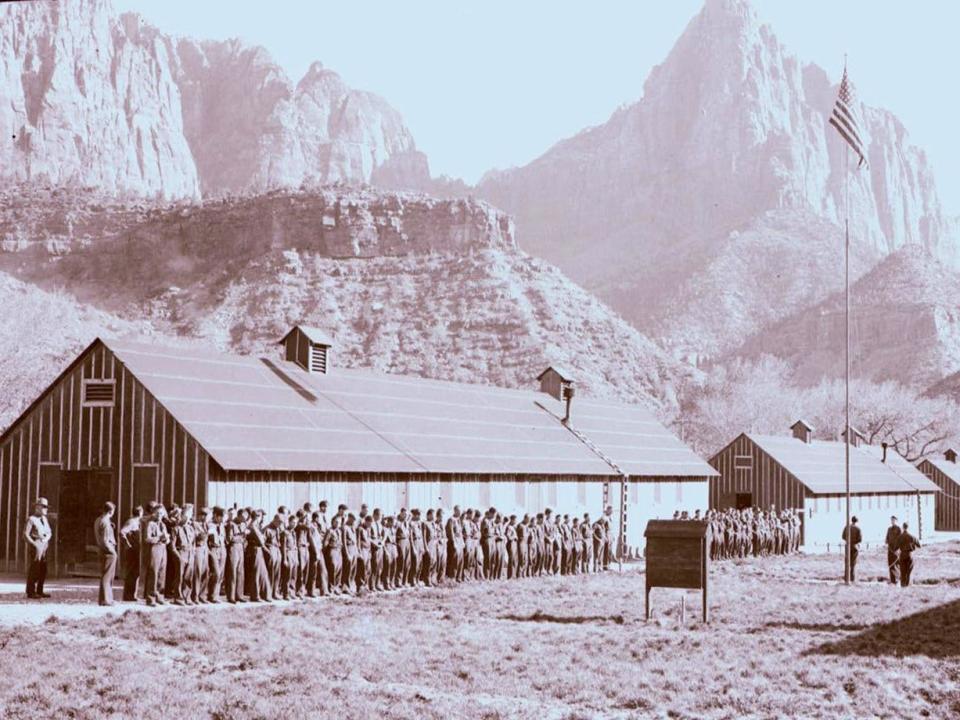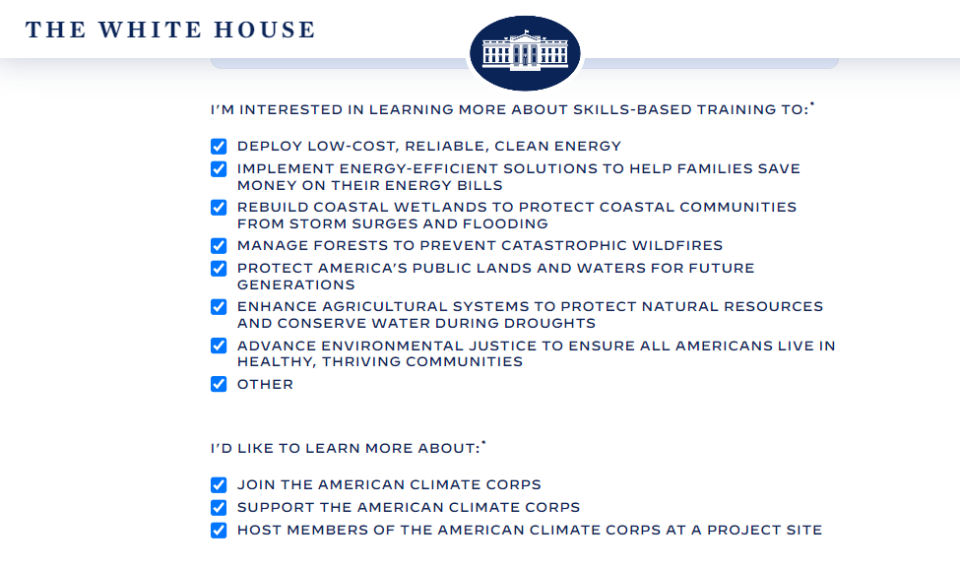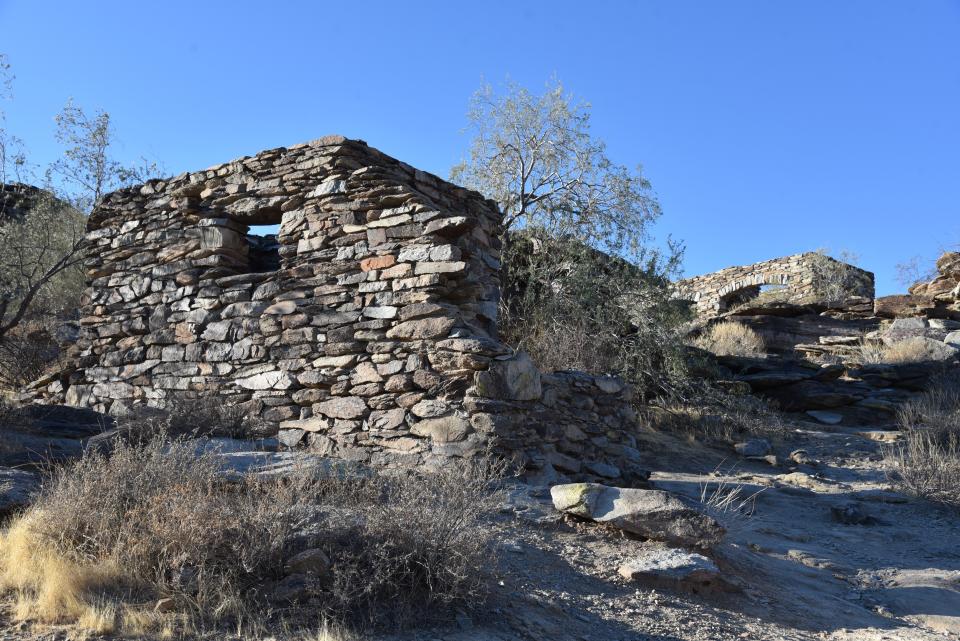Nobody in Arizona seems to know what's happening with Joe Biden's Climate Corps
- Oops!Something went wrong.Please try again later.
Back in September, President Joe Biden unveiled his American Climate Corps initiative and announced its launch in five states, including Arizona.
The program, which he and members of his administration have repeatedly touted in climate-related news conferences over the months since, promises to train 20,000 young people nationwide for "good-paying careers in the clean energy and climate resilience economy."
Biden's American Climate Corps aims to bolster the country's response to the climate crisis through employment opportunities for young people, much like Franklin D. Roosevelt's Civilian Conservation Corps of the 1930s put nearly 3 million young men to work on environmental improvement projects in response to the Great Depression.
"Today, five new states – Arizona, Utah, Minnesota, North Carolina, and Maryland – are moving forward with state-based climate corps that are funded through public-private partnerships, including AmeriCorps, which will work with the American Climate Corps as implementing collaborators to ensure young people across the country are serving their communities, while participating in paid opportunities and working on projects to tackle climate change," the White House's Sept. 20 news release said.
Yet, more than two months after its official Arizona launch, no one seems to know much about what the initiative will bring to the state in terms of funding or new opportunities, which clean energy gaps these workers will fill, when more information will be available to interested applicants or even who will be overseeing the new positions.

While questions go unanswered, enthusiasm wanes
In mid-October, The Arizona Republic spoke with Russ Dickerson, assistant director for AmeriCorp's "Arizona Climate Resilience Corps," which is an existing environmental literacy training program run out of Northern Arizona University in Flagstaff.
“Right now I don’t know about any additional information about American Climate Corps except for what the White House put out in that press release and, actually, that original press release is better than what’s just up on their website,” Dickerson said at the time.
Sandy Bahr, director of the Sierra Club's Grand Canyon Chapter, regularly interacts with young people interested in getting involved in climate action and related careers, including members of AmeriCorps programs, whom she described as dedicated and hard-working. She, too, had heard few details about Biden's new American Climate Corps program.
“The thinking, I believe, is that this will help people move, almost like an apprenticeship program, into full-time jobs or at least give them some training to prepare them for careers in these particular areas," Bahr said. "There’s a lot of work to do."
Heat records toppled like dominoes: How do we know which numbers tell the story?
Bahr has been referring interested applicants to the White House's online portal for the program, which, as Dickerson noted, is simply a form to request more information.
For lack of details elsewhere, a Republic reporter signed up in early October and again in early December to be notified about skills-based training. Opportunities through the American Climate Corps program, the portal claims, include options to "deploy low-cost, reliable, clean energy," "manage forests to prevent catastrophic wildfires," "protect America's public lands and waters for future generations" and "enhance agricultural systems to protect natural resources and conserve water during droughts" — all actions experts agree would benefit Arizona's climate resilience.

After submission, the website promised to "be in touch with more information as soon as it's available." But the White House has not yet sent any additional details related to this request.
Ojas Sanghi, a sophomore at the University of Arizona who helps organize Tucson-based members of the youth-led climate justice organization AZ Youth Climate Coalition, also signed up to receive more information about the American Climate Corps shortly after the Sept. 20 announcement. When The Republic first communicated with him in mid-October, he expressed excitement about the program.
"The Climate Corps is a great step to fully realize the positive potential of climate action and set up job pathways to enable people to work on climate, and I'm excited to see its potential," Sanghi said. "The sidewalks of my university were laid down by FDR's Works Progress Administration, and every day I notice the 'WPA' in the concrete underneath my feet. I am hopeful for Biden's Climate Corps to be as impactful, if not more."

But by early December, when Sanghi had still not received any details about the program or how it might help him prepare for a career in climate action, his enthusiasm for the initiative had cooled.
"I have a wealth of questions about what the ACC is, how it would work, what kind of work those enrolled in it would do, what the timeline would be, etc. Everything is up in the air and I'm confused as to why more details about the program haven't been revealed as of yet," Sanghi wrote in an email update.
"I think this tracks with the conflicting actions Biden's administration has taken on climate action. They passed the (infrastructure law) and the (inflation reduction act), both watershed pieces of legislation that will greatly accelerate climate action. But at the same time, his administration has approved thousands of oil drilling permits on federal land after he campaigned on ending those. To youth climate activists, these juxtapositions are perplexing and disappointing."

Sanghi is not alone in feeling confusion about Biden's climate directives. In October, around 80 students in a conservation biology class at Arizona State University gathered for a careers panel to learn how they could help protect the environment after graduation. When asked about the American Climate Corps program during class, only 12 had heard about it and none knew how to apply.
Heading into an election year, youth apprehension about Biden's commitment to the climate has grown, with students organizing in marches and summits to demand "action, not words" from the president as he asks for their votes but often falls short of their expectations.
From the top, promises but still no specifics
The Republic also contacted the White House to learn what sort of relief Biden's American Climate Corps will bring to Arizona and received few concrete answers.
Maggie Thomas is special assistant to the president in the Biden administration's climate office. In mid-November, she mentioned the American Climate Corps during a video presentation to people gathered for a climate event at ASU, saying the president "will put 20,000 young people to work by next summer in jobs around clean energy, climate resilience and climate mitigation and provide training opportunities to put all these young people on a pathway to good paying union jobs in a clean energy economy."
Two days later, Thomas spoke with The Republic about what the ACC will mean for Arizona, but couldn't offer specifics about how many of those 20,000 positions would be based here, what their assigned tasks or training goals would be, which federal agency they would be organized under or when interested applicants would learn more about the work slated to begin next summer. She said the administration is still lining up collaborators and planning listening sessions to explore applicant interests.
"These things are always easier said than done when it comes to stitching together government programs," Thomas said. "But in order to implement the American Climate Corps and really fulfill this multi-agency recruitment effort, we're going to sign an MOU between DOL, DOI, USDA, NOAA, DOE, AmeriCorps, and EPA that will really formalize the new initiative."
Our investigation into heat and housing: As Arizona builds to solve a housing crisis, will its homes withstand future heat extremes?
When asked why Biden would declare the American Climate Corps active on Sept. 20, when it appears still nothing has been set into motion more than two months later, Thomas said the president wanted to make the announcement during New York City's Climate Week. That's an annual gathering of climate leaders that coincides with the UN General Assembly and has taken place since 2009, with limited results.
"I don't think there's any hiding of the ball here other than to say we are very hard at work, trying to work across seven different agencies and leverage the interagency to align all of these programs and stand up the internal infrastructure that we need to stand up to deliver on an historic initiative like this," Thomas said.
"That just takes time. There's many different ways to announce stuff coming out of the White House, one of which is to say that we're going to do it and we have sort of an open, transparent process over the course of a number of months."
She then recommended The Republic reach out to Arizona Gov. Katie Hobbs' office for more information on how the ACC would manifest in the state, noting that the governor's offices in each of the states Biden mentioned on Sept. 20 had also made "parallel and related but independent announcements with us on the Climate Corps."

Round and round the questions go
When The Republic initially contacted Hobbs' office for information about the state rollout of Biden's ACC in early October, before speaking with the White House, the request was met with uncertainty over who was handling the initiative.
After a week, Olivia Christiani, director of communications for the Governor's Office of Youth, Faith and Family, replied that she needed to consult with the AmeriCorps program at NAU.
Christiani then responded that "the NAU program Arizona Climate Resilience Corps and the 'American Climate Corps' announced by the White House are presently the same" and "the Arizona Climate Resilience Corps was set to launch in time to do so in conjunction with President Biden's announcement of the American Climate Corps."
In her explanation, Christiani linked to meeting minutes from an Oct. 4 presentation about NAU's Arizona Climate Resilience Corps program by AmeriCorps representatives Erin Kruse and Russ Dickerson. In that meeting, they shared with the governor's youth and family office that "AZCRC received $945,000 in flexible, private philanthropy from the California Volunteers Fund" in addition to $474,000 in AmeriCorps funding from the state.
The minutes mention the ACC only to note that NAU's project "is additive to/connected to President Biden's recent announcement of the American Climate Corps, intending to build an Arizona Climate Initiative more inclusive than just the single AZCRC program."
Read our climate series: The latest from Joan Meiners at azcentral, a column on climate change that publishes weekly
"As far as the money coming into the state connected with the American Climate Corps specifically announced through the White House, the answer is $0," Christiani wrote.
But Dickerson, the AmeriCorps representative first interviewed for this story, told The Republic in a follow-up a week after his presentation to the governor's office that his program was "not exactly connected to the American Climate Corps. I’d characterize it as a complementary effort."
He also clarified that this AmeriCorps program for environmental literacy training at NAU is in its third year and was not launched to coincide with Biden's ACC, which has never mentioned environmental literacy as one of its aims.
A month later, on Nov. 17, Dickerson added that, while he still didn't have details about Biden's ACC or how it will interface with existing AmeriCorps programs in Arizona, he and his coworkers are "super excited about the American Climate Corps and we expect these initiatives will be very much aligned."
He confirmed his current program's existence is supported primarily by philanthropic dollars from California, and thanked the federal AmeriCorps agency and Hobbs' office for continued supplementary funding.
Dickerson suggested The Republic reach out to the White House about specific questions. But after that conversation, which had already taken place, the White House had asked Hobbs' office to reconnect with The Republic to offer more clarity. When they did so, Hobbs' communications director, Christian Slater, referred The Republic to Dickerson's Oct. 4 presentation and to AmeriCorps for more information.
Answering a call to service, but without a goal or a need?
One indication the American Climate Corps initiative had not brought its essential partners up to speed before Biden announced its launch in five states was that his Sept. 20 press release included a public request for AmeriCorps "to consider expanding access to Segal AmeriCorps Education Awards to American Climate Corps members conducting national service work."
In her call with The Republic, Maggie Thomas explained this $1,600 education stipend is typically awarded to participants who complete more than 1,700 hours of service with AmeriCorps and can be used to enroll in post-secondary education or pay off student loans.
The Biden administration hopes this will help organize the ACC so participants working in different agencies "adhere to a common set of programmatic standards that provide pathways to high-quality employment opportunities," Thomas said. She also suggested organizers streamline the experience by "leveraging existing programs and resources" for the 20,000 future recruits.
The Republic reached out to local, regional and national AmeriCorps representatives about existing programs and resources, but did not learn more about what leverage the ACC might bring to Arizona.
On Tuesday, Jonah Bryson, press secretary at AmeriCorps national, responded to repeated requests for details about what Biden's ACC will mean for Arizona and when it will launch here with a list of what AmeriCorps' existing climate programs across the nation have recently accomplished.
"Last year, we invested more than $117 million in climate and conservation projects — a 20 percent increase over the previous year," Bryson wrote. "And, also last year, our members preserved and protected more than 3 million acres of state and national parks, trained hundreds of thousands of people in conservation and energy efficiency, and restored thousands of miles of waterways, to name a few examples."
He added that Arizona-based AmeriCorps efforts have addressed extreme heat by planting trees and providing residents with sunscreen, helped the town of Superior manage wildfire risk, and worked with the Conservation Legacy's Veterans Fire Corps and the U.S. Forest Service on prescribed burns.
He did not address questions about what these activities have to do with ACC's stated goal of building a "clean energy" workforce, whether these preexisting programs will be absorbed into or expanded via the new ACC initiative, or if any funding has been earmarked for the creation of new AmeriCorps-style climate programs in Arizona.
Bryson noted that Biden's leadership played a role in creating the Forest Corps program, which Bahr of the Sierra Club thinks could benefit Arizona and which did start accepting applications nationwide on Dec. 1.
A clean energy workforce: Solar jobs are coming to Arizona, and environmentalists, economists and engineers can't wait
He suggested that a $2 billion pot of money made available on Nov. 20 through the Environmental Protection Agency for climate justice projects aligned with Biden's Justice40 initiative could potentially fund "programs to be included in the American Climate Corps." And, he said that "so far, young people are answering President Biden’s call and signing up by the tens of thousands to be a part of this historic (ACC) initiative," including youth from Arizona.
But he fell short of specifying any programs, positions, participating agencies, target climate objectives or funding amount Arizona might someday see related to Biden's initial announcement.
Bryson and others also did not respond to queries about the status of the ACC in any of the other states where Biden has announced its launch.
It's possible these answers await the outcome of the listening sessions Thomas suggested are pending. When White House representatives come to Arizona to inquire about needs for the ACC, they may find that workers already in clean energy jobs across the state feel unsure about whether there will be a need for such training unless solar projects really ramp up. Arizona-based experts in renewable energy have repeatedly criticized the state for being slow to capitalize on its abundant sunshine.
Bill Ruiz is a second-generation carpenter and a business representative for the Arizona Carpenters Union, which includes many workers who install solar panels for large projects across the state. From his point of view, there are currently more trained clean energy workers than clean energy work.
He also said Arizona already has several accredited training programs for young people interested in careers in clean energy, some of which have received support from Biden's Inflation Reduction Act.
"We're not experiencing right now a shortage of labor or a shortage of trained workers to do the projects," Ruiz said. "Right now, the projects are going dormant until that (IRA) money starts to flow. If we had more projects, we could staff the projects tomorrow."
While key questions still loom large — nearly three months after the program's launch — about what new benefits the American Climate Corps may bring to Arizona, another timely question is whether Biden's seemingly premature announcement of the initiative may have lost him some support among young climate voters.
"When it comes to the ACC, his administration announced the program, which made a big splash when it landed, but so far haven't done anything to follow up on it," said Sanghi, the University of Arizona student. "Biden has been the most climate-focused president we've ever had, and his achievements will resonate for years. Few alternatives would have been better in this regard. But he has a decidedly mixed record, and the ACC program is a microcosm of this."
Joan Meiners is the climate news and storytelling reporter at The Arizona Republic and azcentral.com. Before becoming a journalist, she completed a doctorate in ecology. Follow Joan on Twitter at @beecycles or email her at joan.meiners@arizonarepublic.com. Read more of her coverage at environment.azcentral.com.
Sign up for AZ Climate, The Republic's weekly climate and environment newsletter.
Support climate coverage and local journalism by subscribing to azcentral.com at this link.
This article originally appeared on Arizona Republic: Nobody in Arizona knows what's happening with Biden's Climate Corps

